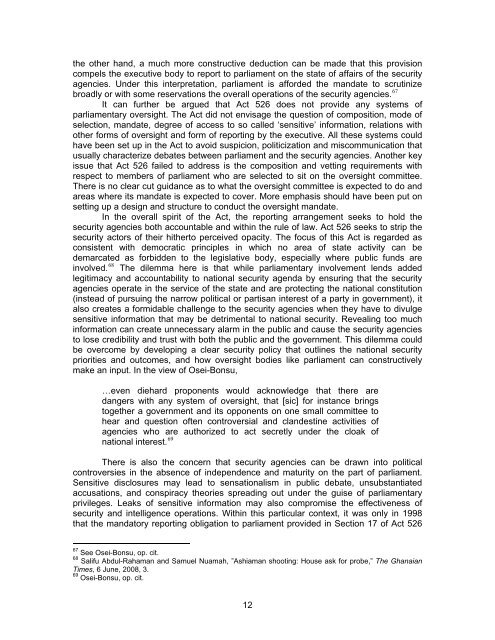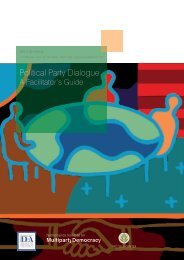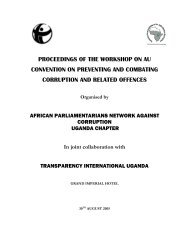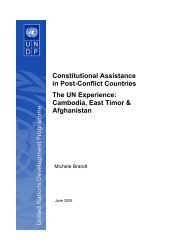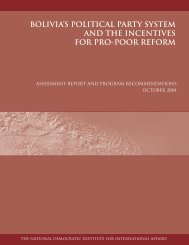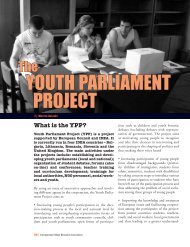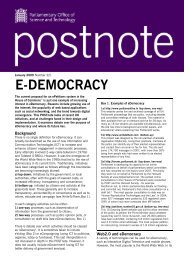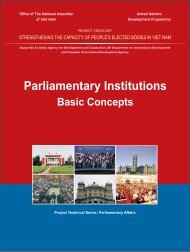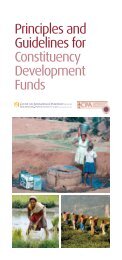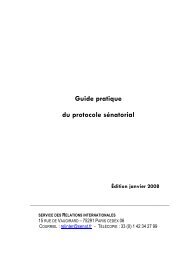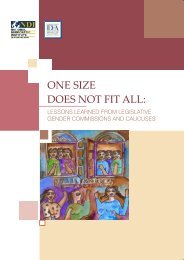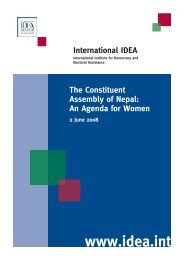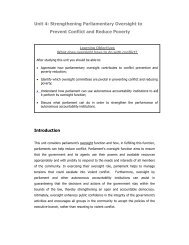Parliamentary Oversight of the Security Sector: Lessons from Ghana
Parliamentary Oversight of the Security Sector: Lessons from Ghana
Parliamentary Oversight of the Security Sector: Lessons from Ghana
You also want an ePaper? Increase the reach of your titles
YUMPU automatically turns print PDFs into web optimized ePapers that Google loves.
<strong>the</strong> o<strong>the</strong>r hand, a much more constructive deduction can be made that this provisioncompels <strong>the</strong> executive body to report to parliament on <strong>the</strong> state <strong>of</strong> affairs <strong>of</strong> <strong>the</strong> securityagencies. Under this interpretation, parliament is afforded <strong>the</strong> mandate to scrutinizebroadly or with some reservations <strong>the</strong> overall operations <strong>of</strong> <strong>the</strong> security agencies. 67It can fur<strong>the</strong>r be argued that Act 526 does not provide any systems <strong>of</strong>parliamentary oversight. The Act did not envisage <strong>the</strong> question <strong>of</strong> composition, mode <strong>of</strong>selection, mandate, degree <strong>of</strong> access to so called ‘sensitive’ information, relations witho<strong>the</strong>r forms <strong>of</strong> oversight and form <strong>of</strong> reporting by <strong>the</strong> executive. All <strong>the</strong>se systems couldhave been set up in <strong>the</strong> Act to avoid suspicion, politicization and miscommunication thatusually characterize debates between parliament and <strong>the</strong> security agencies. Ano<strong>the</strong>r keyissue that Act 526 failed to address is <strong>the</strong> composition and vetting requirements withrespect to members <strong>of</strong> parliament who are selected to sit on <strong>the</strong> oversight committee.There is no clear cut guidance as to what <strong>the</strong> oversight committee is expected to do andareas where its mandate is expected to cover. More emphasis should have been put onsetting up a design and structure to conduct <strong>the</strong> oversight mandate.In <strong>the</strong> overall spirit <strong>of</strong> <strong>the</strong> Act, <strong>the</strong> reporting arrangement seeks to hold <strong>the</strong>security agencies both accountable and within <strong>the</strong> rule <strong>of</strong> law. Act 526 seeks to strip <strong>the</strong>security actors <strong>of</strong> <strong>the</strong>ir hi<strong>the</strong>rto perceived opacity. The focus <strong>of</strong> this Act is regarded asconsistent with democratic principles in which no area <strong>of</strong> state activity can bedemarcated as forbidden to <strong>the</strong> legislative body, especially where public funds areinvolved. 68 The dilemma here is that while parliamentary involvement lends addedlegitimacy and accountability to national security agenda by ensuring that <strong>the</strong> securityagencies operate in <strong>the</strong> service <strong>of</strong> <strong>the</strong> state and are protecting <strong>the</strong> national constitution(instead <strong>of</strong> pursuing <strong>the</strong> narrow political or partisan interest <strong>of</strong> a party in government), italso creates a formidable challenge to <strong>the</strong> security agencies when <strong>the</strong>y have to divulgesensitive information that may be detrimental to national security. Revealing too muchinformation can create unnecessary alarm in <strong>the</strong> public and cause <strong>the</strong> security agenciesto lose credibility and trust with both <strong>the</strong> public and <strong>the</strong> government. This dilemma couldbe overcome by developing a clear security policy that outlines <strong>the</strong> national securitypriorities and outcomes, and how oversight bodies like parliament can constructivelymake an input. In <strong>the</strong> view <strong>of</strong> Osei-Bonsu,…even diehard proponents would acknowledge that <strong>the</strong>re aredangers with any system <strong>of</strong> oversight, that [sic] for instance bringstoge<strong>the</strong>r a government and its opponents on one small committee tohear and question <strong>of</strong>ten controversial and clandestine activities <strong>of</strong>agencies who are authorized to act secretly under <strong>the</strong> cloak <strong>of</strong>national interest. 69There is also <strong>the</strong> concern that security agencies can be drawn into politicalcontroversies in <strong>the</strong> absence <strong>of</strong> independence and maturity on <strong>the</strong> part <strong>of</strong> parliament.Sensitive disclosures may lead to sensationalism in public debate, unsubstantiatedaccusations, and conspiracy <strong>the</strong>ories spreading out under <strong>the</strong> guise <strong>of</strong> parliamentaryprivileges. Leaks <strong>of</strong> sensitive information may also compromise <strong>the</strong> effectiveness <strong>of</strong>security and intelligence operations. Within this particular context, it was only in 1998that <strong>the</strong> mandatory reporting obligation to parliament provided in Section 17 <strong>of</strong> Act 52667 See Osei-Bonsu, op. cit.68 Salifu Abdul-Rahaman and Samuel Nuamah, ”Ashiaman shooting: House ask for probe,” The <strong>Ghana</strong>ianTimes, 6 June, 2008, 3.69 Osei-Bonsu, op. cit.12


